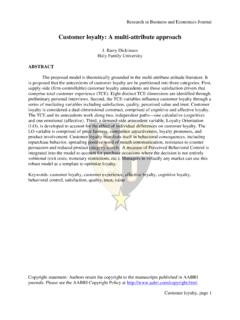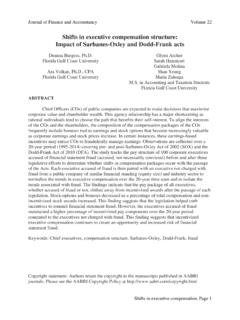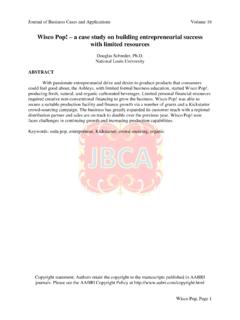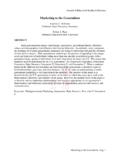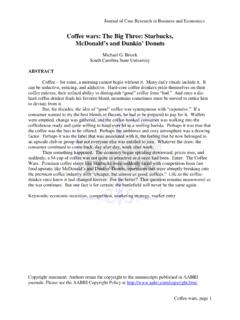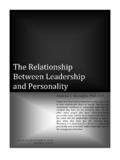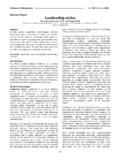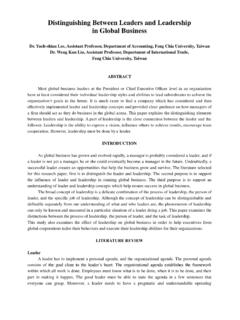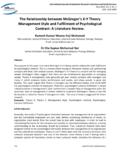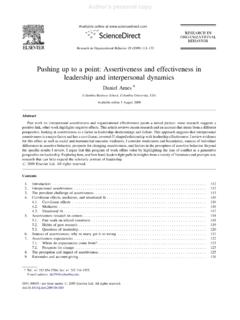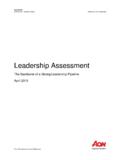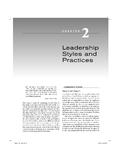Transcription of The role of leadership between the employees and …
1 Journal of Management and Marketing Research The role of leadership between the employees and the organization: a bridge or a ravine? -an empirical study from China . Pan Jing-zhou Qufu Normal University Zhou Xiao-xue Qufu Normal University Zhou Xia-qing Jinan Engineering Vocational Technical College Abstract The relationship between the leaders and members, not only affects employee performance, but also can affect the relationship between employees and organizations. To explore the impact of LMX on affective commitment, we introduced psychological empowerment as a mediate variable. The result showed a significant mediate role. Psychological empowerment can partially mediate the relationship between LMX and affective commitment. The introduction of POS for the moderate variable was conducted.
2 The results showed that moderate role is not significant. POS can not moderate the relationship between LMX and affective commitment. LMX is very important for the employees - organizational relationships. Keywords: leader-member relationship, perceived organizational support, psychological empowerment, affective commitment Fund Support: soft science research projects of Shandong Province in China (2008 RKA198). The role of leadership , Page 1. Journal of Management and Marketing Research 1 Introduction leadership is essentially the core and spirit of organizations. As the people in charge, they not only manage the organization's affairs but also deal with the general employees face to face. Entrusted with the task to communicate organizational goals, visions and ideas to employees , leaders are responsible for maintaining and implementing organizational rules and systems and even have the final say on promotion, retention and dismissal.
3 Therefore, in a sense, leaders at all levels are spokespersons of their own organizations, serving as the bridge and link connecting employees . In the eyes of employees , can leaders represent their organizations? To what extent does the relationship with the leadership influence employee 's attitude towards his or her organization? These are questions this study undertakes to explore and answer. The Leader - Member Exchange theory (referred to as LMX) believes that the relationship between leaders and members in an organization develops over time through a series of observations, tryouts, interactions and conversations (Graen, 1987). When a leader is close to his or her subordinates, they will consider each other "in-group"; the other subordinates to the leader will become "out-group".
4 LMX is based on the Social Exchange Theory. When leaders and their subordinates have closer relationships, the latter will tend to receive better performance evaluations and more promotion opportunities, and mutual trust, respect and care are more likely to happen between subordinates and their bosses (Graen, 1982); in return, subordinates will show more loyalty and respect for the leadership , resulting in higher leadership effectiveness. Studies show that "in-group" members are generally 20%. more efficient job performance and 50% more satisfied with their jobs than "out-group". members (Mayfield, 1998). In the Chinese culture, power is worshiped and familism and authoritarianism are emphasized. In this context, can we draw the same conclusion?
5 In Chinese organizations, the leader - subordinate relationship can be more than just a hierarchy or job affiliation; it may be complicated by moral human relations. Compared with westerners, Chinese are more focused on emotions allowing leaders in Chinese organizations to establish closer emotional relationships with their subordinates that transcend the organizations themselves. To be the "in-group" member is the ideal that is aspired after. However, can affection strengthen employees ' commitments to the organization? The paper using Psychological Empowerment as the mediator variable and Perceived Organizational Support as the moderator variable discusses how the leader - member exchange relationship influences attitudes towards organizations and tries to unravel its impact mechanism.
6 The role of leadership , Page 2. Journal of Management and Marketing Research 2 Theories and Hypotheses LMX and organizational affective commitment Graen and Dansereau et al. first proposed the leadership - Members Exchange Theory (LMXT) in 1972. LMX suggests that leader will take different approaches in dealing with subordinates, while subordinates may response in different way. Hence, different categories of relationship between leaders and subordinates may emerge. Due to the limit of resources and time, leaders can only establish special relations with a small proportion of members within organizations. This small proportion is considered "in-group", who will receive more favor, trust, respect and benefits. In return, the favored subordinates will show more trust, respect and care towards their leaders.
7 In this way, a high level of interaction is created. Dienesch and Liden believe that LMX has 3 dimensions, namely, affection, contribution and loyalty (Dienesch, 1986). Based on this and the approach of key incident interview, Liden and Maslyn (1998) added a fourth dimension: professional respect. High quality leader - member relationship not only benefits the leadership , but also has positive impact on member's attitude towards the organization. Researches by Major, Kozlomski, Chao &. Gardner (1995), Lee (2001) and other scholars indicate that high quality leader - member exchange relationship is positively correlated with organizational commitment and negatively correlated with turnover. Element analysis made by Gerstner and Day (1997) also shows that LMX are positively correlated with organizational commitment.
8 Allen and Meyer(1990) proposed a three-factor model of organizational commitment, including: affective commitment, continuous commitment and normative commitment, of which affective commitment refers to employees ' emotional dependence, recognition and engagement towards organizations and more focused on the affection side of organizational commitment. Leader is the agent of the organization and his or her words and behaviors represent and follow organizational decisions. The improvement of leader - member relationship will enhance members' affection towards the organization. Hence, LMX and organizational affective commitment are interrelated and represented through the following hypothesis. Hypothesis 1: LMX has a positive impact on organizational affective commitment.
9 The Mediating Effect of Psychological Empowerment in LMX's Impact on Affective Commitment Psychological empowerment was proposed by Thomas (1990) and others in 1990. Thomas et al. pointed out that psychological empowerment was multidimensional and specifically manifested in four cognitive dimensions, namely, meaning, self-efficacy or competence, self-determination and impact. As a psychological sense, psychological empowerment stems from a very important source, that is, the perception on self - other relation, the individual's interpretation or reaction psychologically projected on structural empowerment (Hechanova, 2006). Many studies have shown that high-quality LMX. relationships will enable subordinates to sense more empowerment (Liden, 2000; Ayree, 2006; Wat, 2005).
10 In high LMX relationship, subordinates have more freedom in decision-making, more influence and flexibility. These advantages enable subordinates to The role of leadership , Page 3. Journal of Management and Marketing Research feel the ability to control their own destiny, and therefore more perceived empowerment. Psychological empowerment and organizational commitment are also closely related. Janssen (Janssen, 2004) believed that psychological empowerment can promote employees '. organizational commitment. A large number of studies have shown that employees who feel that they have been empowered are likely to remain more committed to their organizations (Allen, 1990; Liden, 2000). Empowered employees will consider themselves more capable of influencing their work and organization in a more meaningful way and more willing to stay in the organization.

